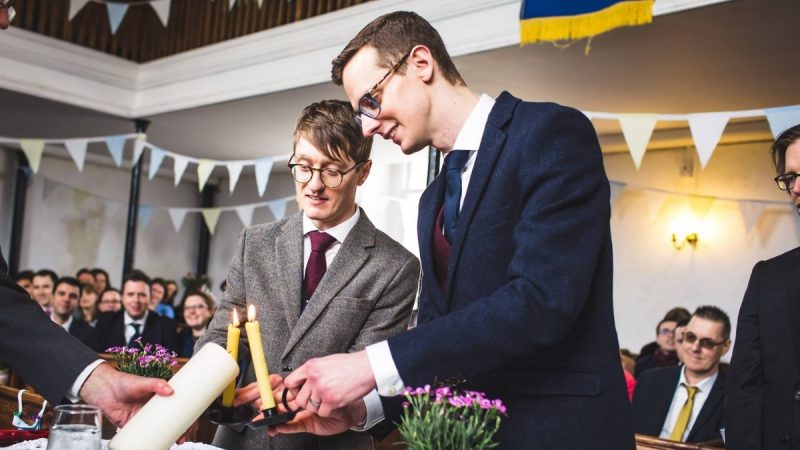Unitarians leading the way on religious same-sex marriage

New research by the universities of York and Leeds into the experience of same-sex couples who seek religious marriage ceremonies reveals the huge obstacles same-sex couples still face, how Unitarians continue to lead the way in offering religious same-sex marriage, and the ways in which marriage law in England and Wales “sustains faith-based discrimination against same-sex couples”.
Our Chief Officer, Liz Slade, says: “This research shows the incredible positive impact that same sex weddings in places of worship can have on people’s lives – and the pain that is caused by places that have chosen not to honour them. In the years since marriage equality came into law, the majority of places of worship in the UK have chosen not to become registered to conduct same sex weddings, and are perpetuating the marginalisation of LGBTQ+ people. I’m proud that Unitarian and Free Christian churches are the largest proportion of places of worship that conduct same sex weddings – but I would love this not to be the case. We are a small denomination, and our leadership in this area shows just how far there is to go for equality in other faith groups. I’m grateful for the many years of hard work of LGBTQ+ people and allies in our own movement, and of our friends in the Quakers and Liberal Judaism who were part of the fight for equality in marriage, as well as each individual congregation that has registered to conduct same sex weddings – they have allowed families and friends to celebrate love together, of all couples, and do so in a way that honours their spiritual lives as well as being recognised in law.”
Some key findings of the research:
- “Same-sex religious marriage is lawful but nevertheless difficult to access.”
- “English marriage law sustains faith-based discrimination against same-sex couples.”
- “Of the 22,500 places of worship in England and Wales that are currently registered for the solemnization of different-sex marriage, only 267 places of worship (approximately 1.2 per cent) are currently also registered for the solemnization of same-sex marriage.“
- “Most of these places of worship are part of Christian religious traditions that are considered theologically liberal, with Unitarian churches forming
the largest proportion (although there are also Spiritualist and other non-Christian places of worship that have chosen to opt in).” - “For the last year for which data are available, marriage by way of a religious ceremony accounted for 23 per cent of marriages between different-sex couples but only 0.6 per cent of marriages between same-sex couples.”
- “Having a religious marriage was a profound experience for the couples in our sample, and one which many felt had longer-term ramifications for their lives and relationships.”
- “The search for a suitable place of worship in which to marry was anxiety-provoking for a number of couples given their previous experiences of religious hostility or rejection because of their sexual orientation. However, having found a place of worship in which to marry, couples described their weddings as transformative events that not only held great personal significance but also had wider social and community repercussions.”
The article is: Silvia Falcetta, Paul Johnson and Robert M. Vanderbeck, ‘The Experience of Religious Same-Sex Marriage in England and Wales: Understanding the Opportunities and Limits Created by the Marriage (Same Sex Couples) Act 2013’, International Journal of Law, Policy and The Family (2021), 00, pp.1-27. It can be accessed online (behind a paywall) here.
Find out more about same-sex marriage in a Unitarian church here.
Find out more about Unitarian support for LGBTQIA+ equality here.